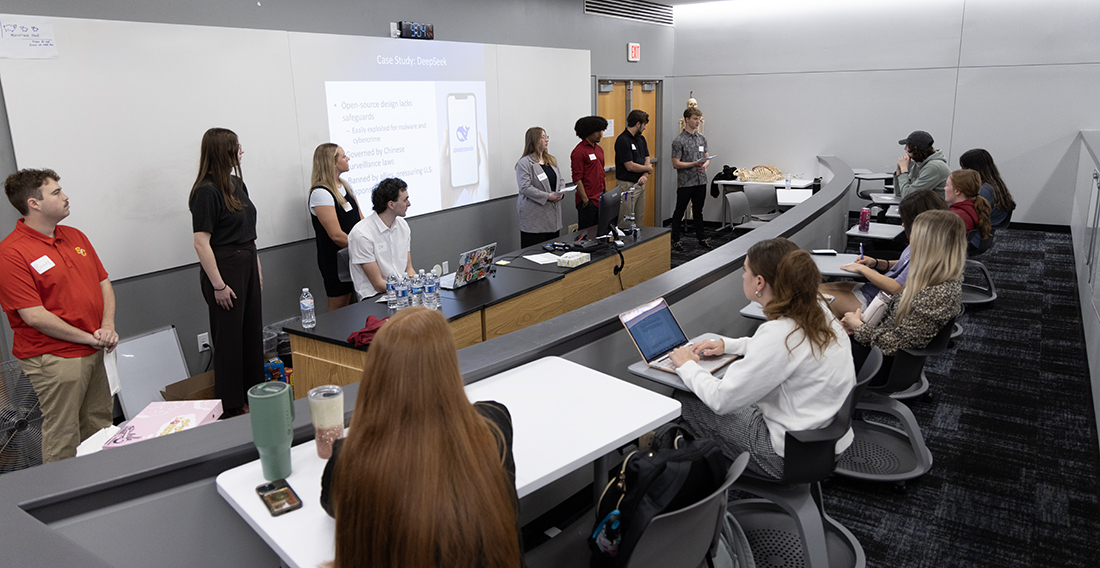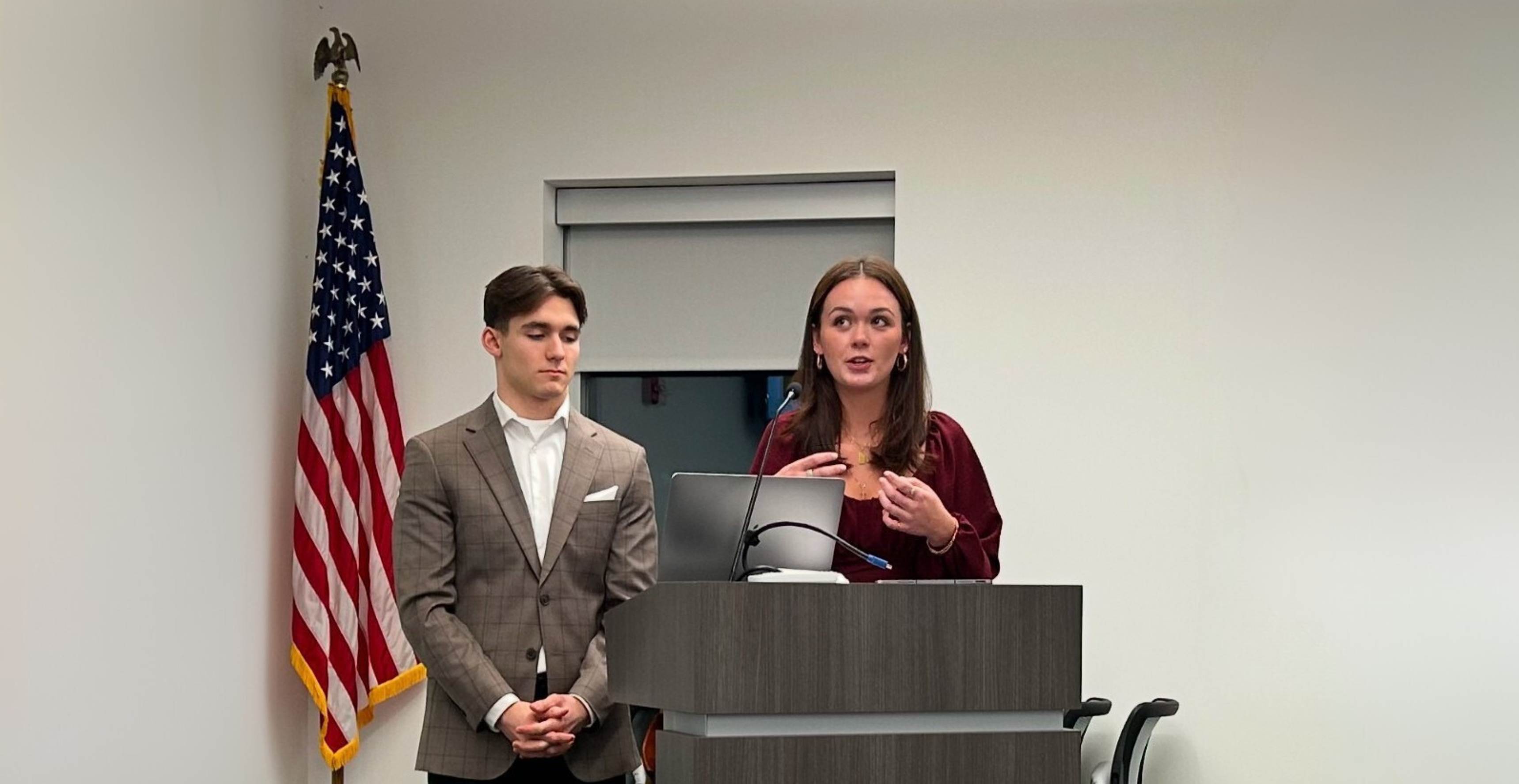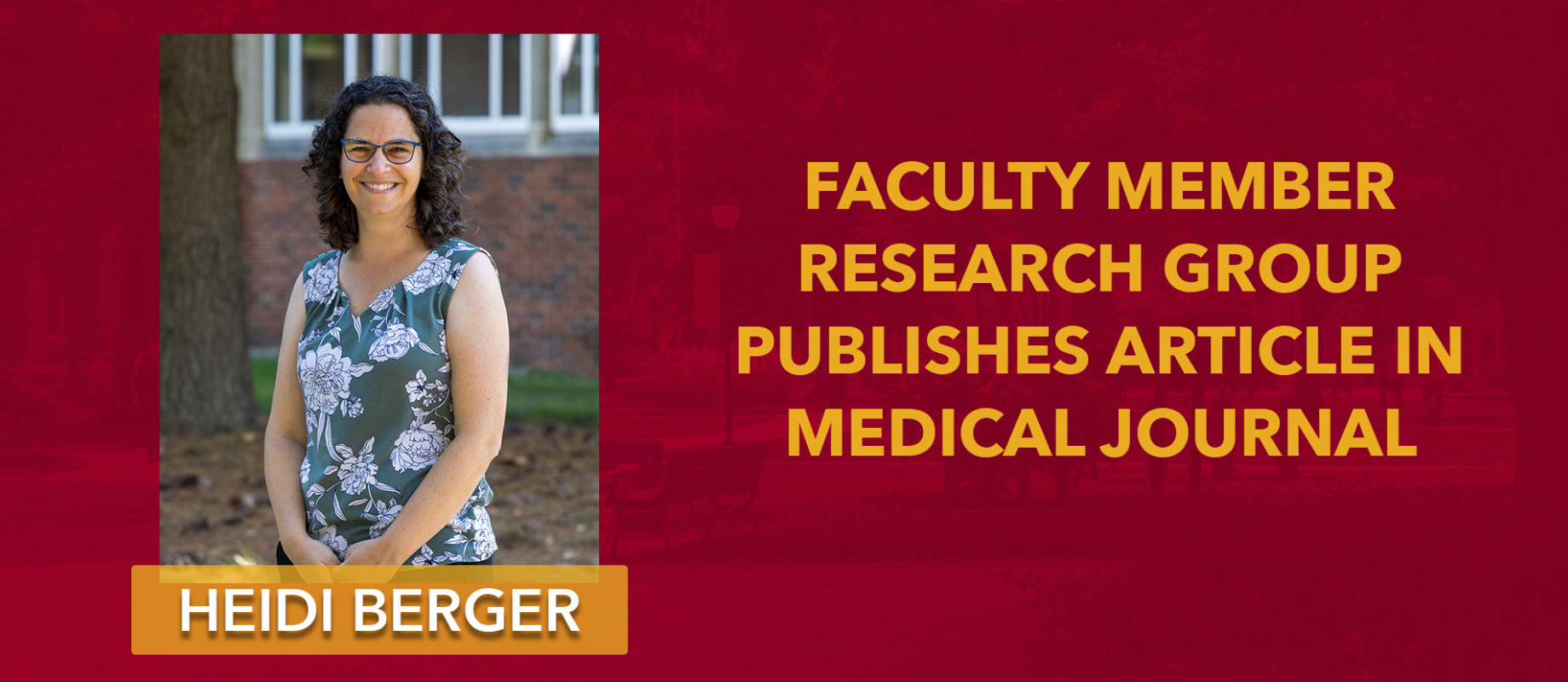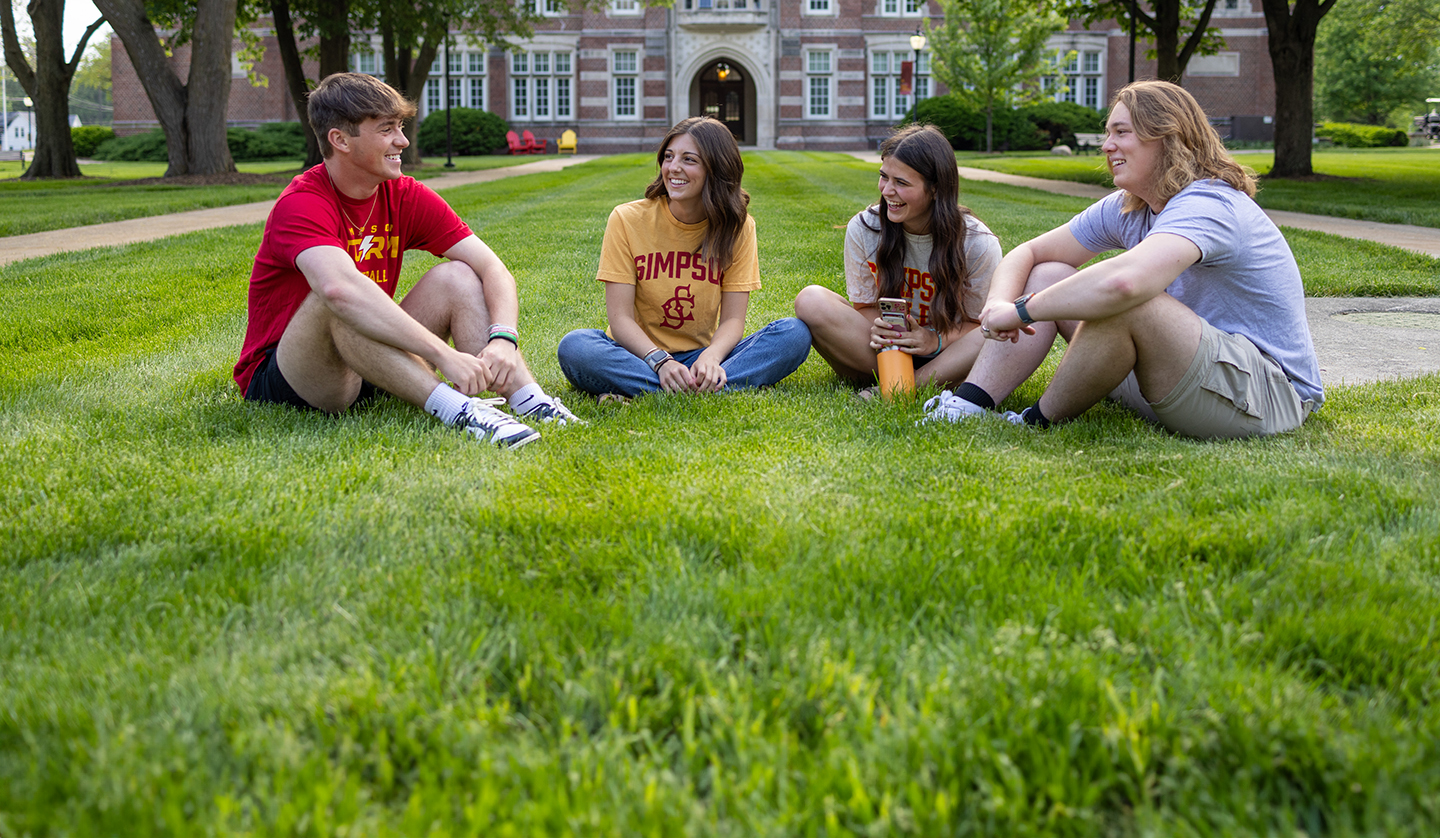The "Big Six" Advantage: Why Simpson is More Than Worth It

While more people are questioning the value of college education, compelling data shows that it remains a smart and sound investment with profound advantages. A recent Georgetown University study, for example, confirms that college graduates earn about $1 million more in lifetime earnings than those without a college degree, on average.
Simpson graduates consistently start strong, with the Class of 2022 achieving an average 94 percent employment and graduate school placement rate (see Page 26). What drives such stunning success at Simpson? There are at least six big factors that distinguish a Simpson education.
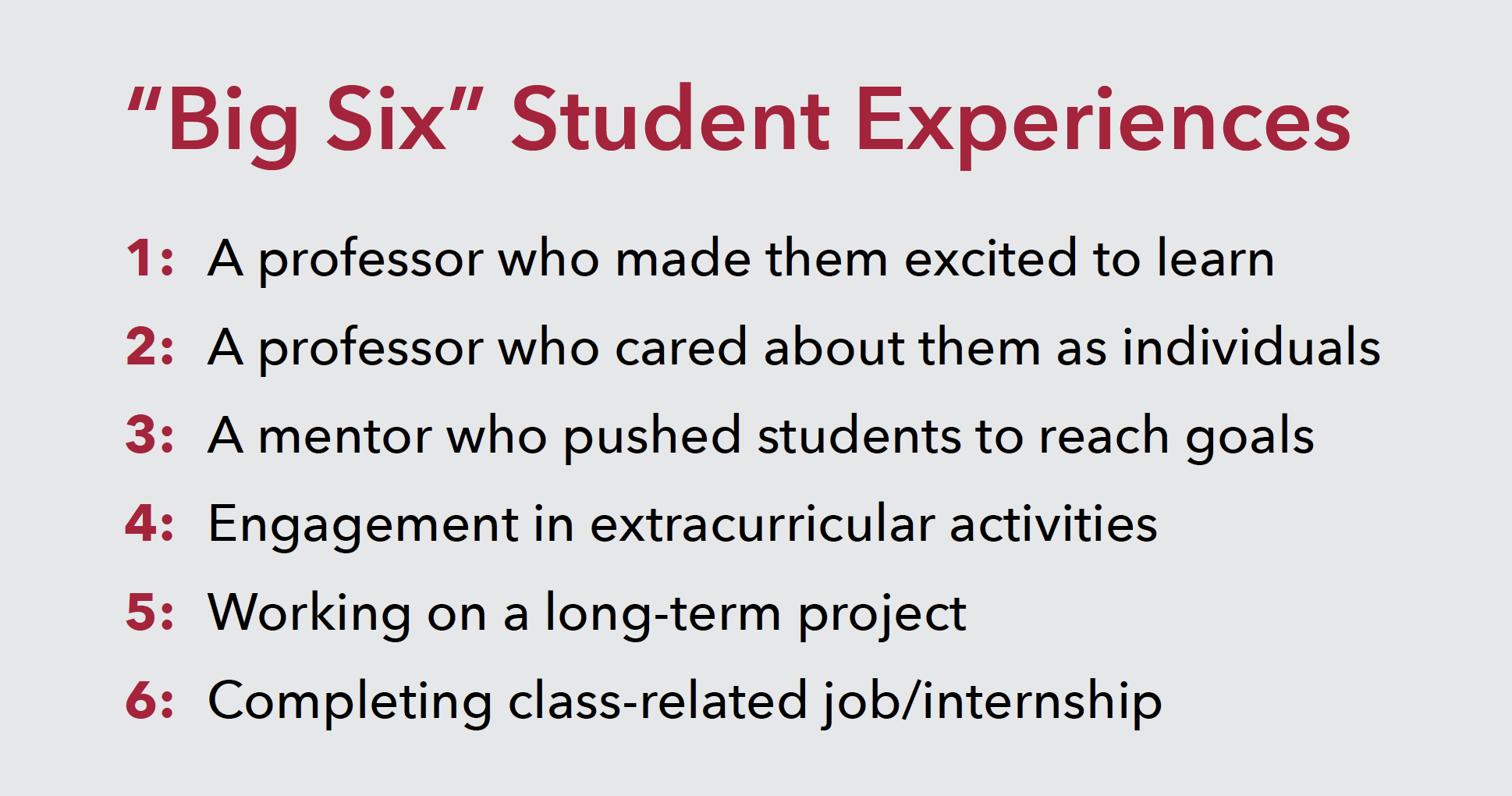
National research of more than 30,000 college graduates conducted by Gallup, Purdue University and the Lumina Foundation has identified the “Big Six” undergraduate experiences most closely correlated with long-term career success and personal fulfillment.
Thriving college graduates report having multiple “Big Six” experiences — and the more of them, the better. That’s especially great news for Simpson alumni.
For the traditional Class of 2023, 86 percent of Simpson graduates reported having at least three “Big Six” experiences compared to the national average of 32 percent. Further, this year only two percent of college graduates nationwide reported having all six experiences while more than 20 percent of Simpson graduates say they had them all.
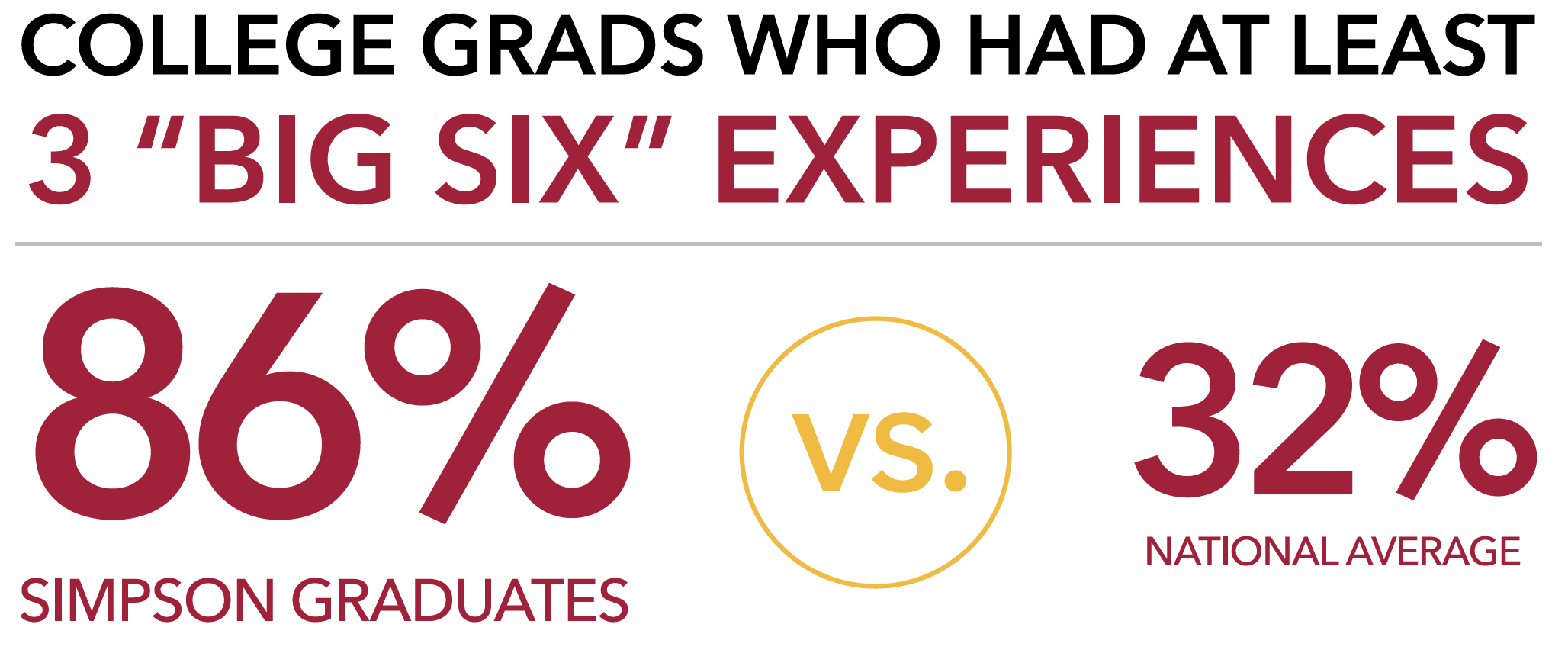 The “Big Six” experiences we provide are transformational in equipping our students with the power tools they need to compete and excel in any circumstance —communication, teamwork, and problem-solving skills,” said President Jay Byers. “Integrating those tools with a commitment to serving the world’s greater good consistently leads to fulfilling success for our graduates.” In the stories that follow, meet a few of the faculty, students and alumni who create and benefit from the difference-making impact of “Big Six” experiences at Simpson.
The “Big Six” experiences we provide are transformational in equipping our students with the power tools they need to compete and excel in any circumstance —communication, teamwork, and problem-solving skills,” said President Jay Byers. “Integrating those tools with a commitment to serving the world’s greater good consistently leads to fulfilling success for our graduates.” In the stories that follow, meet a few of the faculty, students and alumni who create and benefit from the difference-making impact of “Big Six” experiences at Simpson.
Faculty Impact
More than 9 out of 10 Simpson graduates say they had at least one faculty member who made learning exciting. Representing a wide breadth of disciplines and distinctively unique teaching styles, Simpson faculty are united by one common desire — to create extraordinary learning experiences as they help students realize their full potential.
1: Reacting to the Past–History Offers “Game On” Excitement
The days of traditional classroom lectures serving as the singular dominant pedagogy at Simpson is ancient history. Today’s classes are all about active and involved learning for all students.
A prominent feature of the history curriculum is a series of “Reacting to the Past” learning modules, which are immersive role-playing games centered on engaging with significant historical events and ideas.
This semester, for example, Professor Nick Proctor’s first-year Foundations classes are spending two weeks role playing the contentious issues regarding the Vietnam War during the Chicago Democratic Convention of 1968 — a simulation exercise Proctor wrote.
“Students are encountering these ideas and conflicts through the eyes of somebody who was there, rather than as themselves,” said Proctor. “It gives students an opportunity to build historical empathy you really can’t get any other way.”
Students, including Drew Klein ’24, are buying in to Proctor’s teaching techniques. “I took a role-playing class and I was very skeptical going in. “[But] I loved it. Not only did I pick up on the concepts, but I was also working much closer with my classmates to accomplish academic goals.”
“These games have kept me more engaged with the content we are learning in class,” added Shaniah Temple ’25. “[They also] helped me continue to strengthen my writing ability because of all the different roles I had to write during the games.”
Proctor’s department colleagues, Rebecca Livingstone and Judy Walden, also write games and employ reacting pedagogy in their courses.
“I think anything that gets students to think of history not just as this dead past to be memorized, but something that matters — that’s what we’re after,” said Walden, professor of history. “We try to help them see that the ideas they’re debating still have resonance now.”
Indeed, the history games offer much more than just a fun and exciting way to get through course material. The skills and lessons learned have lasting benefits.
Not only do students develop deeper historical understanding,” said Proctor, “they also leave Simpson with with transferable skills employers are looking for — like public speaking, team building and problem solving.”
2: Creating Credible Connections
Professor of Multimedia Communications Lisa Carponelli has a reputation for keeping it real with her students. Coming to Simpson in 2008 after gaining prominence as a television news anchor, she has a passion for preparing students to become authentic and creative video story tellers.
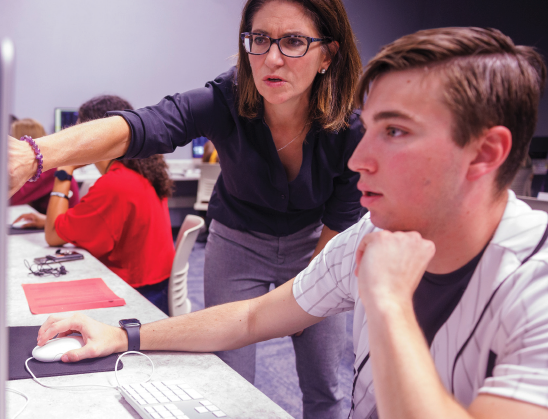 Her students learn by doing, most frequently leveraging the simple recording capabilities available on their smart phones.
Her students learn by doing, most frequently leveraging the simple recording capabilities available on their smart phones.
“I usually have students out filming a bit during class time, and then our classroom becomes a large editing suite, where everyone is at a desktop with headphones editing their footage. There’s a lot of collaboration and creative ideas zipping around the room — it’s a blast.”
Carponelli’s students corroborate her claims.
“She offers lots of hands-on help and in-class activities to make certain we completely understand what we’re learning,” said Aaron Wilkins ’25. “She teaches us to always revise our work to make it better and better until we reach perfection.”
“Professor Carponelli relates everything we do in class to real life outside of college,” said Maddie Hays ’25. “This makes it easy for her to push us toward our goals because we are able to take the skills we are learning and use them outside the classroom setting.”
One of Carponelli’s mentees, Sophie Reese ’23, is a news producer for WHO-TV in Des Moines. She says Carponelli put her on the right path from the get-go, creating an ideal environment for learning from day one.
“The energy she brought to the classroom was unlike any other professor I had,” said Reese. “She was kind, yet tough when she needed to be — she wasn’t afraid to call it how it is, which I admire. From Comm 101 to my senior capstone, she was a big part in preparing me for the real world.”
And, as fate would have it, Reese and Carponelli are now on the same team at WHO-TV. While Carponelli continues to teach at Simpson, she is returning to life on-air as a part-time weekend news anchor at WHO-TV.
“It’s pretty incredible to realize that my former students will now be my colleagues,” said Carponelli. “It doesn’t get any better than that.”
3: Pushing to Peak Performance
Cal Busby ’09 is the picture of positivity and possibility thinking. Simpson’s former athletic trainer, now assistant professor of Sport Science and Health Education, is well known for his student-centered commitment and always sunny disposition. He loves what he’s doing, and it shows.
“I’m essentially the students’ cheer section,” said Busby. “I help them find new paths when things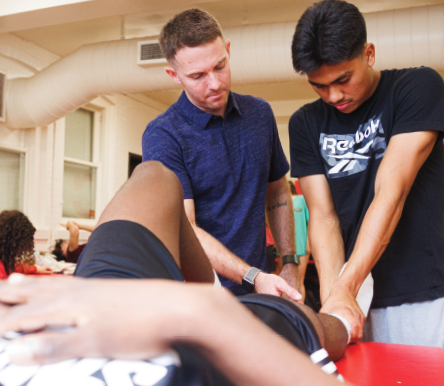 get tough and celebrate successes with them as they go through college.”
get tough and celebrate successes with them as they go through college.”
Maddie Jansen ’22 is a perfect case in point. When she wanted to change majors, Busby teamed with Jansen’s other adviser, Professor of Biology and Environmental Science Clint Meyer, to develop a plan. It worked out beautifully as Jansen realized her dream grad school placement at the University of Iowa, where she is pursuing a doctorate in physical therapy.
“Cal saw what I wanted to achieve, and he helped me reach it,” said Jansen. “He consistently encouraged me to chase after what I wanted and discouraged me from selling myself short.”
The story is similar for Maxie Saceda-Hurt ’22. Busby went all out to help Saceda-Hurt prepare for graduate school success. Today, she is pursuing her master’s degree in athletic training at the University of Northern Iowa.
“He really takes the time to get to know his students,” said Saceda- Hurt. “After having him for four years, it was easy for him to help plan my future and I trusted him to do so. He believes in students more than they believe in themselves and sees their potential.”
Busby is quick to emphasize that the great results are part of a strong team effort. In addition to students benefitting from the rich diversity of faculty expertise and experience, they also gain the kind of hands-on, practical experience they need to go most anywhere.
“My colleagues and I have all worked in the field, so we can share those experiences,” said Busby. “Most importantly, though, I think we do a good job of exposing students to a variety of career options and helping them make connections with professionals in the field, especially our Simpson alumni.”
4: Extra Curricular Engagement
Involvement is the name of the game at Simpson. Yes, athletics are a big part of it, with 60 percent of students competing in one or more of the College’s 25 varsity sports. But, as the two students profiled here illustrate, there are many other outstanding cocurricular opportunities to pursue that also enhance the student experience and provide vital life skills.
Always All In
Graduating from a small-town Iowa high school boasting a class size of 32, Treye Teske ’24 says he “fell in love with the small community vibe” at Simpson. Having also visited some much larger universities in Iowa during his college search, he felt much more at home at Simpson.
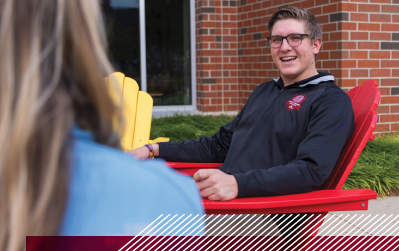 “It’s one community here — it really is. It’s this idea that anyone can be part of anything, and everyone works together to get you as involved as you want to be.”
“It’s one community here — it really is. It’s this idea that anyone can be part of anything, and everyone works together to get you as involved as you want to be.”
The former basketball player turned varsity volleyballer serves as Senior Class president and president of his SAE fraternity, while being actively engaged in many other student clubs and organizations.
“I have always given a 100 percent to everything I’ve been involved in at Simpson,” said Teske. “It’s helped me discover different aspects about myself and other people. Learning about leadership, team building, and working as a community is really big for me— especially as I prepare for a career in law enforcement.”
His recent internship with the Johnston Police Department is among the many Simpson experiences that have positioned him to realize his aspirations.
“How close we are to Des Moines and all the connections we have there has really helped me propel and get my foot in the door in many different areas. Being part of my fraternity has helped me to grow, too. I think Simpson does an amazing job preparing you for your future.”
Doing Everything, Everywhere
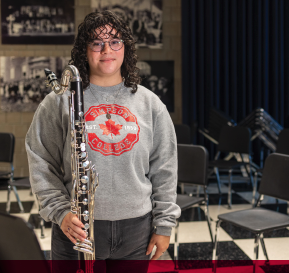 Culvers Fellow and philosophy and Spanish double major Trenity Rosenberg ’23 has experienced life to the fullest at Simpson.
Culvers Fellow and philosophy and Spanish double major Trenity Rosenberg ’23 has experienced life to the fullest at Simpson.
Student clubs and organizations like symphonic band and Latinos Unidos? Check. Internship with the Latino Political Network? Check. Study abroad in Spain? Check. Collaborative contributor to wastewater treatment research project resulting in a paper presentation at the 19th International Conference on Environmental, Cultural, Economic, and Social Sustainability? Check!
Has it all been worth it? Absolutely.
“By being active, I’ve gotten to know a lot of people,” said Rosenberg. “I especially like being in Latinos Unidos — to be part of my community and helping to educate the Simpson community on important topics. Simpson has made me a very well-rounded student.” Rosenberg hopes to earn a Ph.D. in philosophy and become a college professor.
5: Research Rewards
The benefits of completing a long-term project during college are well documented — especially as they relate to critical thinking, communication, and collaboration. At Simpson, such opportunities abound in rich variety, including an array of student-faculty research. And students are taking full advantage.
Gaining Real Artificial Intelligence
Each spring, more than 100 students showcase their work at Simpson’s Research & Creativity Symposium. Their presentations feature a wide range of academic disciplines and co-curricular endeavors — Highlighting work completed over a semester, or longer, time frame.
At the 2023 symposium, one team of six students presented “Rage Against the Machine: ChatGPT’s War on Higher Education.” Formation of the team and subject matter resulted from an organic, open process empowering students to conceive and create their own project in a class taught by Professor of Management Mark Green.
“I enjoyed the free flow of it,” said Kegan Trebilcock ’26, a member of the ChatGPT research team. “Professor Green literally just tossed us into it — we weren’t even in groups for the first month. The whole class just researched topics of interest and then as our ideas came together, we just figured out [our team] and what to do.”
The ChatGPT research team featured a dynamic mix of first years to seniors, representing majors and minors from accounting, business management, marketing and political science. Over the course of the semester, the group developed a strong chemistry for efficiently and effectively tackling the project.
“A lot of it was just figuring out workload management,” said Trebilcock. “When you have a group like ours, everyone is going to be capable of different things. We just needed to organize in a way that got the right people to the right position to make it work.”
“I think a lot of confidence came with that process and how we broke it all down,” said group member Eldred Boria ’25. “We all had our roles. Then we just worked as a group to combine everything and put it all together.”
Professor Green says semester-long project endeavors like the one completed by the ChatGPT team are invaluable in helping students connect course work with what occurs in an actual business setting. As they move through their projects, Green sees remarkable growth in his students.
“They experience first-hand the classic stages of team development that they learn in various management courses. At the end of the day, everyone brings something unique to the table and the result is a ‘win-win’ all the way around.”
“I felt like the project was beneficial as a whole,” said Dylan Holland ’25. “Working in groups on long-term projects is something we’re all going to experience in our careers. So this is definitely going to help us in the future.”
6. Internships Open Doors
Each year, hundreds of Simpson students gain internship experience that often leads directly to exciting career opportunities, frequently where they interned. Meet three students who are using their internships to illuminate and strengthen their career prospects.
Changing Game Plans
For Elise Boulton ’24, Plan A was to find a small college where she could play basketball. But she remembers her high school coach counseling her to pick a college where if she quit or got injured, she would want to stay there. His advice proved to be prophetically wise.
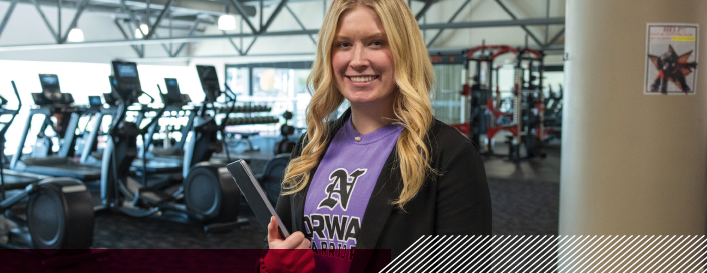
“Sure enough, I did get injured,” said Boulton. “I had knee surgery this past summer and I’ll have another knee surgery in December, so I’m done playing basketball. But I wanted to stay here, obviously, so I know I made the right choice going to Simpson.”
Her injury setback has not benched her active pursuit of a career in sports administration. To the contrary, she has had two internships focused on that goal. Her first was with the Iowa Girls High School Athletic Union in the summer of 2022, following her first year at Simpson.
Boulton started out doing social media content creation and assisting with the Union’s spring and summer championships. Her performance earned additional playing time. She went back to work there part-time during her sophomore year and returned yet again for May Term last spring, when she really picked up her game.
“I was a secondary administrator for tennis, so I did everything,” said Boulton. “I got to run my own state championship site — doing the bracketing, dealing with concessions, ticketing, and merchandising. It was super cool, and I loved all of it.”
This year, she’s interning with the athletic director at Norwalk High School, assisting with high school and middle school fall sports. The sum of her internship experiences has helped sharpen her focus.
“I had no idea which niche of sports administration I wanted to pursue initially. Now I know that I love event management and operations. That’s been the biggest take away.”
Next semester, Boulton will gain more experience working in Simpson’s athletic department, before graduating next spring — a full year early. From there, she expects to put the full-court press on bigger and better opportunities. Ultimately, she covets securing a position with either the NCAA, NAIA, or Girls’ Athletic Union.
Patrolling His Future
Elijah Keopuhiwa-Carvalho ’25 has always had his eyes on a career in law enforcement. He had no idea just how far he would have to go to pursue that dream. Today, he finds himself five time zones away from his Hawaiian home to study criminal justice at Simpson.
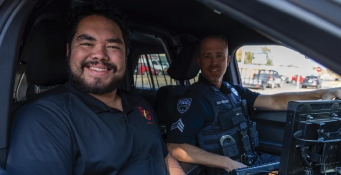 What a journey it has been. He initially explored West Coast schools close to home, but quickly determined all those options were far too expensive. So, he extended his search across the mainland looking at all kinds of possibilities before striking gold (and red).
What a journey it has been. He initially explored West Coast schools close to home, but quickly determined all those options were far too expensive. So, he extended his search across the mainland looking at all kinds of possibilities before striking gold (and red).
“Simpson was just one of the recommendations that popped up on my college application website,” said Keopuhiwa-Carvalho. “I really wanted to be a criminal justice major, and Simpson was the number one criminal justice program out of the 19 schools I applied to.”
Keopuhiwa-Carvalho says he absolutely made the right choice, speaking highly of Associate Professor of Criminal Justice Denise Leifker and the mentoring she has provided during his time here. He’s ecstatic about landing an internship with the Indianola Police Department (IPD) this fall as a junior — securing the one spot they had available.
He primarily does ride-along shifts with patrolling officers, giving him an insider’s view of their day-to-day encounters and responsibilities. He’s also getting the chance to shadow the school resource officer for Indianola Schools to get a glimpse of how he interacts with students.
The experiences are helping him make important connections between what he is learning in the classroom and the realities of working in law enforcement.
“Three years into my major, I know the basics of how laws work and are enforced,” said Keophuhiwa-Carvalho. “Now those things are beginning to show up in my internship. Whether it’s simply seeing how officers communicate with dispatch or recognizing signs of someone who is high on drugs, as I learned in class instruction, things are coming together.”
Combining his internship insights with other in-the-field experiences, such as his May Term class that featured visits to three different correctional facilities, Keopuhiwa-Carvalho says he has reinforced confidence in his professional plans.
“Going into this, I was hesitant about whether I would actually like it. But, I’ve had a blast, and this is looking like the career path I wanted since I was four years old.” Keopuhiwa-Carvalho says he is considering another internship before seeking a police officer position upon graduation in May 2025.
Legal Matters
Kylie Banouvong ’24 spends a lot of time in arguments. When she’s not competing with Simpson’s national champion speech and debate team, she’s frequently listening to criminal hearings as part of her internship at the Polk County Attorney’s Office.
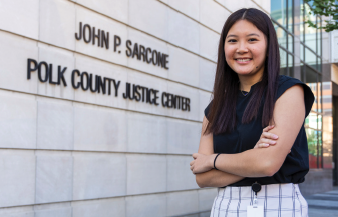 The aspiring attorney is getting an insider’s look at law while engaging in a variety of legal tasks. In addition to taking in criminal hearings, Banouvong spends much of her time reviewing citizen complaint sheets or listening to Victim-Offender Dialogue (VOD) requests or interactions. Her assignments are often self-directed, necessitating pro-active independent initiative.
The aspiring attorney is getting an insider’s look at law while engaging in a variety of legal tasks. In addition to taking in criminal hearings, Banouvong spends much of her time reviewing citizen complaint sheets or listening to Victim-Offender Dialogue (VOD) requests or interactions. Her assignments are often self-directed, necessitating pro-active independent initiative.
“I have a lot of free range to do things,” said Banouvong. “They [Polk County attorneys] want you to develop your own skills to figure out how to solve problems. For example, on a citizen complaint sheet I check to see if charges can be filed based on Iowa codes. Doing it all on my own is super helpful as I become a better critical thinker and learn to focus on the little details.”
The internship is helping Banouvong excel more in her major course work — and vice versa. Her ability to connect the dots is accelerating week by week. Along the way, she is becoming much more self-assured.
“I’m on the shy side. But now I’m a lot more confident in the classroom because I know better what I’m talking about. Then I’m able to go back to my internship and utilize what I’m learning in class.”
While her sights are still set on law school, she is considering the possibility of taking a gap year after graduation next spring. Her supervising attorneys at Polk County have reassured her she will be more than ready whenever she decides to go to grad school.
“They told me it’s good that I’m getting this experience, especially at a big county like Polk. What I’m doing is so much better than just going straight into law school. It’s going to make my transition so much smoother.”
Article Information
Published
December 11, 2023
Author
Roger Degerman

